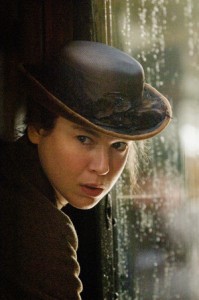Miss Potter – miscast

Imagine that
![]()
Miss Potter – Chris Noonan
Innocence is by definition unknowing. The ‘magic of childhood’ isn’t something a child experiences but an effort by adults to describe the palpable, heart-stopping delight they see in the eyes of children entranced, absorbed in a picture, a story, a game. Or poignantly, cherished memories of their own childhood. Most of us have a favourite image that captures this sense of magic and wonderment: for me it is of two children on the beach, a boy about 7 protectively clutching the hand of his barely 5 year-old sister: a beautiful sunny day, skipping weightlessly towards the enticing sea. Now that’s magic. To us. To them it is just life. So far.
It is clear that Beatrix Potter caught something of the essence of this childhood innocence and delight in her simple drawings of anthropomorphised animals dressed in neat and tidy human clothes and having the kind of adventures children could identify with. The only response that counts to some of the most popular children’s characters ever created, is that of those for whom they were intended. And for over 100 years those small customers have been confirming that Miss Potter got it right. Whatever some of us might think.
The first thing we must say about Chris Noonan’s Miss Potter is that it is not a film for children but for adults. Though at times he seems to forget that himself. It clearly has a respect for the woman and her work. But just as Beatrix Potter needed a special kind of art to touch the hearts of children, so a filmmaker needs more than respect, he needs artistry to marshal the considerable tools at his disposal to try to capture the spirit of a rather remarkable woman. Tread softly Mr Noonan for you tread on our (children’s) dreams. And our memories. Precious memories.
And here, for me Noonan fails pretty comprehensively for the worst of reasons. Rene Zellwegger follows Paltrow and Kidman as being simply miscast as a quintessentially English woman writer. In all cases, especially this one, the casting was not driven by the artistic needs of the piece but by the desire to put American bums on seats to watch it. For this piece of English whimsy that’s a pretty tall order anyway. But why oh why not stay true to the respect that drove the piece and cast it properly and not for vain hopes of enhanced box-office? Even without constantly distracting lip-pursing and facial grimaces to semaphore what’s she’s thinking, Zellweger acts far too English to be believably English. She’s acting the English bit as well as the character. And for me it just about sinks the picture. In my view she is now un-castable in an English role because her Bridget Jones is a constant ghost at the feast.
Richard Maltby Junior’s screenplay is also imbued with an American’s sense of what the English are like and at times plays like the archetypal ‘English’ speaking butlers beloved of Hollywood’s past. Again why an American, when someone like Julian Fellowes would have got the cadences right? And an Oscar winner to boot. But it’s Noonan’s direction of the performances and the action that is most off key. At times it seems as if he is directing Miss Potter’s life as one of her own stories. And getting it wrong by drifting into a kind of twee, precise preciousness that patronises us in a way Beatrix’s stories never did her young readers. The weak screenplay and misconceived direction leaves fine actors like Bill Paterson and especially Barbara Flynn struggling to make their characters something more than cardboard caricatures. Emily Watson injects a bit of genteel feistiness and naughty humour to lighten things up a bit but the key characters have far less life than the occasional animations of Peter Rabbit and co.
As Miss Potter’s first and almost only love, Ewan McGregor is engaging enough but still seems to be enunciating his lines instead of saying them. The film is prettily shot and due deference is paid to Beatrix’s commitment to her beloved countryside, and her generosity in bequeathing it in a sense to us all. The genteel tragedy that occupied the centre of her life outside writing and illustration is well enough told and the film does not lack affecting moments. But in the final analysis the spirit of the woman who could entrance children with innocent, slight little stories that have lasted over a 100 years simply eludes Chris Noonan’s film.
(March 2007)
Filed under: 3 star, Chris Noonan, Comedy, Drama, General, Hollywood, Romance, Uncategorized

